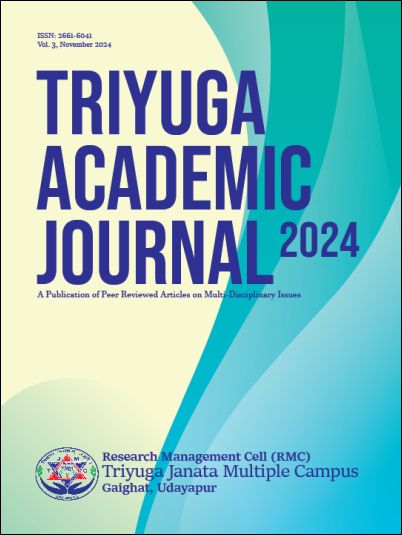Social Security for Elderly in Nepal: Challenges and Solutions
DOI:
https://doi.org/10.3126/taj.v3i1.71972Keywords:
elderly, policy, population, security, socialAbstract
Population aging has been found to occur when a greater proportion of the total population consists of older individuals. Social security has identified to encompass governmental financial support programs aimed at enhancing the welfare of vulnerable groups within society, including children, the elderly, the sick, and the unemployed. It has served as a critical instrument through which governments must be identified to ensure the well-being of their citizens. The challenges arising from population aging has been found to prompt governments to develop policies, plans, and legislation in order to effectively meet the needs of these demographics and address associated issues. Various subtopics have been drawn under the obstacles and hurdles for the addressing of the senior citizens’ issues in Nepal and it has covered the different subtopics like social challenges, economic challenges, healthcare related challenges, and the institutional challenges which have been found to be addressed on time for the solution of the senior citizens’ problems in Nepal. Policy making solution has been analyzed under the various thematic categories like development of comprehensive policy, legislation and rights protection, social support and inclusion, promoting integration, awareness campaigns, economic security, enhancing social security systems, pension reforms, healthcare access and services, improving healthcare infrastructures, affordable healthcare, institutional support and capacity building, capacity building for service providers, coordination between agencies, implementation and monitoring, implementation strategy, monitoring and evaluation have been found to be analyzed and identified. By integrating the components into a cohesive policy framework, Nepal can address the multifaceted challenges faced by senior citizens. It’s essential to draw on international best practices while adapting solutions to suit Nepal’s socio-cultural context and specific needs. Collaboration between government, civil society, and international partners can be crucial for successful policy implementation and sustainable improvement in the quality of life for older adults in Nepal.
Downloads
Downloads
Published
How to Cite
Issue
Section
License
Copyright (c) 2024 Triyuga Janata Multiple Campus

This work is licensed under a Creative Commons Attribution-ShareAlike 4.0 International License.
© Triyuga Janata Multiple Campus




